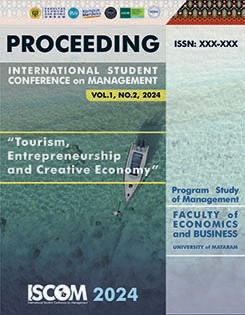THE INFLUENCES OF PERCEPTION, MOTIVATION, INTEREST AND KNOWLEDGE TO CAREER CHOICES IN STARTUP FIELD
Abstract
Introduction : This study investigates the growing interest in entrepreneurship among the younger generation, particularly in startups. It seeks to understand how perception, motivation, interest, and knowledge influence business students' career choices. Using a quantitative approach, data were collected from 117 students at the Faculty of Economics and Business at University Of Mataram through structured questionnaires. These questionnaires assessed students' perceptions of startup opportunities, their motivations, interests in entrepreneurship, and their knowledge of startup operations.
Research Methods : The data were analyzed using Partial Least Squares Structural Equation Modeling (PLS-SEM), which provided a comprehensive understanding of how each factor influences students' career decisions. The findings highlight that interest plays a significant role in students' career choices in startups, even more than perception, motivation, or knowledge. This insight underscores the importance of fostering interest in entrepreneurship among students.
Finding/Results : Based on these findings, the study concludes that educational institutions should focus on fostering students' interest in entrepreneurship through hands-on experiences, mentorship programs, and practical engagement with the startup ecosystem. This approach can better prepare students for successful careers in startups, contributing to a more innovative and dynamic economic landscape. The insights gained from this study can inform the broader discourse on entrepreneurship education and its role in promoting innovation and economic growth.




